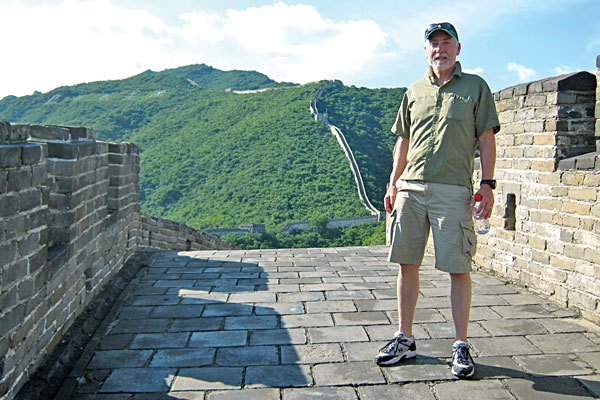Sequim Gazette staff
The China that I came to expect is not here. It might be in the western part of the country, but it’s not here in the big cities … I can’t see any evidence of the communist China I was raised to believe was the reality here … One interesting thing is we talked to kids about homework, and one of (our) teachers asked what they do with homework. They asked, ‘What do you mean?’ They all do their homework. The culture here is about one family, one child … That might have something to do with how well they perform in education … The students are more motivated (in part) because of the parents’ expectations.
— Brian Berg, from the NEA Foundation blog
Through the theoretical curtains of politics, culture, history and about 9,000 miles (as the athletically-gifted crow flies), Sequim teacher Brian Berg found plenty in common — and plenty of contrasts — with his Chinese teaching colleagues.
“The principals and teachers we talked to were not fundamentally different really,” said the Sequim High School math teacher. “We really are all trying to educate the next generation (and deal) with all of the problems we have.”
Berg, a 2011 recipient of the National Education Association Foundation’s Award for Teaching Excellence, joined 25 other award winners from across the United States recently on an eight-day trip to China funded by the NEA Foundation and the Pearson Foundation, touring the cities of Beijing, Shanghai and Hong Kong.
The visit included stops at a school in each of the three cities where he was able to visit with teachers and students.
In Beijing, Berg talked with teachers Li Jing and Xiao Haimei at the Beijing Zhenhua Tourism School. They told him that in China the first nine years of education are compulsory and free, then students take a high school entrance examination. If they pass, students move on to high school; if not, they go to work or to a vocational school like the tourism school.
Berg said students in America might be better served if schools offered them training for fields they can work in by way of vocational programs, rather than trying to prepare each student for an academic college or university.
“In Washington (state) we’re giving out more high-stakes tests,” he said. “We need to provide an education for those who don’t get algebra and science. The idea is a melting pot (but) the reality is we’re losing so many students and doing nothing to provide training for them.”
At the tourism school, Berg also visited with student Shao Xin, or “King.” King said his favorite sport is basketball and his favorite player is Kobe Bryant of the Los Angeles Lakers.
“What I found most striking was the level of motivation of the Chinese students,” Berg noted in an NEA Foundation report. “When we asked the teachers what they did when students did not do their homework, they looked at us quizzically, as if they didn’t understand the question. They said of course the students do their homework, why wouldn’t they?”
A first-time visitor to China, Berg found that expectations from Chinese families seem to be greater than those of American students.
“The cultures are so different,” Berg said. “The (Chinese) kid is really doted on. They’re all totally invested. China sees the benefit of hard work and education. I guess our students aren’t seeing the direct correlation as strongly. In Sequim, kids have MP3 players, cell phones … the top students are doing well as they ever have (but it’s) hard to find motivation for all of students.”
The Sequim educator noted some differences in the teaching profession as well. Li Jing and Xiao Haimei, the teachers from Beijing Zhenhua Tourism School, told him that teaching in China is a very respected job, although teachers in the public schools earn better salaries than those in the private vocational schools. They told him they both hope to get jobs in a public school, but it is a very competitive process.
Berg said the American teachers who went on the trip would continue to communicate and share their insights with each other over the coming months. The NEA Foundation will bring the group back together in Washington, D.C., next February to debrief them on how the experience has influenced their teaching and to help prepare next year’s awardees for their trip to China.
“We’ll kind of be the mentors,” Berg said.
Read more about the National Education Association Foundation and the educators’ trip to China at www.neafoundation.org.



